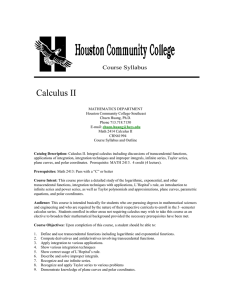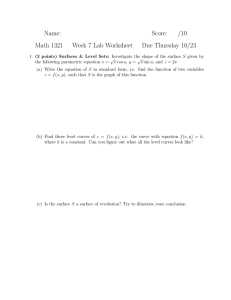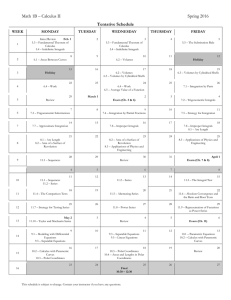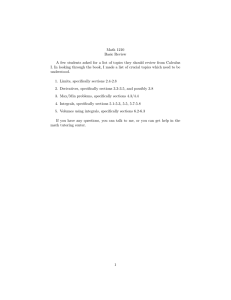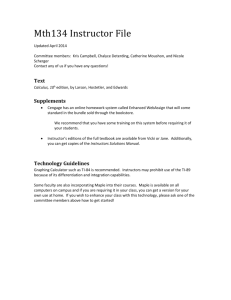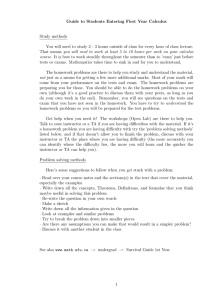M2414CO.doc
advertisement
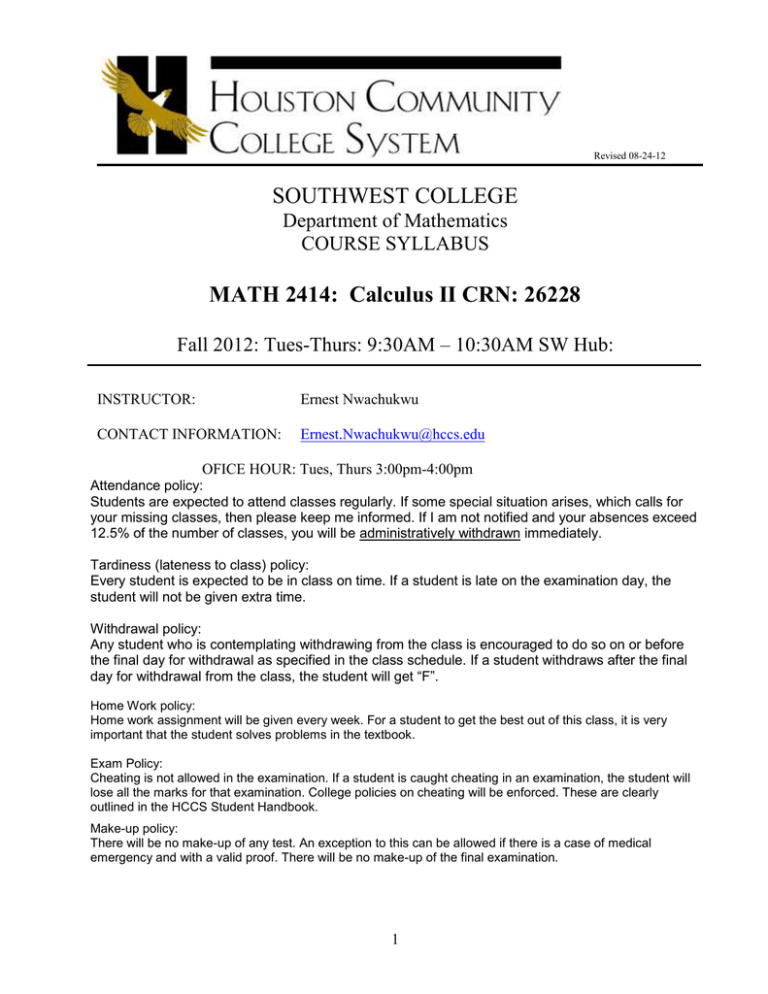
Revised 08-24-12 SOUTHWEST COLLEGE Department of Mathematics COURSE SYLLABUS MATH 2414: Calculus II CRN: 26228 Fall 2012: Tues-Thurs: 9:30AM – 10:30AM SW Hub: INSTRUCTOR: Ernest Nwachukwu CONTACT INFORMATION: Ernest.Nwachukwu@hccs.edu OFICE HOUR: Tues, Thurs 3:00pm-4:00pm Attendance policy: Students are expected to attend classes regularly. If some special situation arises, which calls for your missing classes, then please keep me informed. If I am not notified and your absences exceed 12.5% of the number of classes, you will be administratively withdrawn immediately. Tardiness (lateness to class) policy: Every student is expected to be in class on time. If a student is late on the examination day, the student will not be given extra time. Withdrawal policy: Any student who is contemplating withdrawing from the class is encouraged to do so on or before the final day for withdrawal as specified in the class schedule. If a student withdraws after the final day for withdrawal from the class, the student will get “F”. Home Work policy: Home work assignment will be given every week. For a student to get the best out of this class, it is very important that the student solves problems in the textbook. Exam Policy: Cheating is not allowed in the examination. If a student is caught cheating in an examination, the student will lose all the marks for that examination. College policies on cheating will be enforced. These are clearly outlined in the HCCS Student Handbook. Make-up policy: There will be no make-up of any test. An exception to this can be allowed if there is a case of medical emergency and with a valid proof. There will be no make-up of the final examination. 1 Grading policy: Each of the first four examinations is worth 20%; and the final examination is worth 40% of the final course grade. The final course grade (call it FCG) will be calculated using the formula:FCG = Average of the best five grades (final counting double). Letter grade will be assigned to the FCG. Grade legend: 90% - 100% - A, 80% - 89% - B, 70% - 79% - C, 60% - 69% - D, below 60% - F. Final Examination: The final examination consists of 33 multiple-choice problems. The problems cover only the material required in this course. Americans With Disabilities Act (ADA): Students with Disabilities: Any student with a documented disability (e.g. physical, learning, psychiatric, vision, hearing, etc.) who needs to arrange reasonable accommodations must contact the Disability Services Office at the respective college at the beginning of each semester. BEGINNING OF SEMESTER ADVISEMENT Students are advised about the pre-requisites for the above class and how they are related to their major and the next class to take in mathematics. “Students who repeat a course for a third time or more may soon face significant tuition/fee increases at HCC and other Texas public colleges and universities. Please ask your instructor/counselor about opportunities for tutoring or other assistance prior to considering course withdrawal or if you are not receiving passing grades." END OF SEMESTER ADVISEMENT Students are advised on the future courses in mathematics and how they are related to their majors. All questions were answered. Catalog Description: Calculus II. Integral calculus including discussions of transcendental functions, applications of integration, integration techniques and improper integrals, infinite series, Taylor series, plane curves, and polar coordinates. Prerequisites: Math 2413: Pass with a “C” or better Course Intent: This course provides a detailed study of the logarithmic, exponential, and other transcendental functions, integration techniques with applications, L’Hopital’s rule, an introduction to infinite series and power series, as well as Taylor polynomials and approximations, plane curves, parametric equations, and polar coordinates. Audience: This course is intended basically for students who are pursuing degrees in mathematical sciences and engineering and who are required by the nature of their respective curricula to enroll in the 3 -semester calculus series. Students enrolled in other areas not requiring calculus may wish to take this course as an elective to broaden their mathematical background provided the necessary prerequisites have been made. 2 Course Objectives: Upon completion of this course, a student should be able to: 1. Describe the basic concepts of mathematical functions and the various types of functions, which exist. 2. Demonstrate knowledge of the concept of the limit of a function at a point and the properties such limits possess. 3. Demonstrate knowledge of the idea of continuity of a function 4. Differentiate various types of mathematical functions and know the meaning of the various orders of the derivatives including applications. 5. Recognize the discontinuity points of certain types of elementary functions. 6. Differentiate the trigonometric functions with applications. 7. Use calculus to sketch the curves of certain types of elementary functions Textbook: Calculus by Larson and Edwards; ninth Edition. Calculus 9/e Larson and Edwards Brooks/Cole Student Learning Outcomes 1. Compute derivatives and antiderivatives of transcendental functions. Course Objectives 1.1 Define and use transcendental functions including logarithmic and exponential functions. 1.2 Compute derivatives and antiderivatives involving transcendental functions. 2. Identity and apply the appropriate integration technique, and apply them to set up and solve various applications. 2.1 Apply integration to various applications. 2.2 Show various integration techniques 3. Demonstrate the correct use of L’Hospital’s rule and various techniques for solving improper integrals. 3.1 Show correct usage of L’Hopital’s rule. 3.2 Describe and solve improper integrals. 4. Recognize and use infinite series with attention to the application of the Taylor 4.1 Recognize and use infinite series. 4.2 Recognize and apply Taylor series to 3 series. 5. Demonstrate knowledge of plane curves and polar coordinates. various problems 5.1 Demonstrate knowledge of plane curves and polar coordinates. Course Outline: The instructor may choose to organize topics in any order, but all material will be covered. APPROXIMATE TIME TEXT REFERENCE Unit I - Logarithmic, Exponential, and Other Transcendental Functions (12 Hours) Sections: 5.1, 5.2, 5.3, 5.4, 5.5, 5.6, 5.7, 5.8 This unit presents the concept of logarithms. The instructor should emphasize the natural logarithmic function with respect to differentiation and integration. Inverse functions, exponential functions with respect to differentiation and integration, bases other than e and applications. Inverse trigonometric functions should also be presented. This unit concludes with a study of hyperbolic functions Unit II - Applications of Integration (14 Hours) Sections: 7.1, 7.2, 7.3, 7.4, 7.5, 7.6, 7.7 This unit presents applications of integration. The instructor should emphasize area of a region between two curves, volume-the disc method, volume-the shell method, arc length and surface of revolution, work, and fluid pressure and fluid force. This unit concludes with moments, centers of mass, and centroids. Unit III - Integration Techniques, L’Hospital’s Rule, and Improper Integrals (14 Hours) 4 Sections: 8.1, 8.2, 8.3, 8.4, 8.5, 8.6, 8.7, 8.8 This unit includes integration techniques. The instructor should emphasize basic integration rules, integration by parts, trigonometric integrals and substitution, partial fractions, integration by tables, other integration techniques, and indeterminate forms and L’Hopital’s Rule. This unit concludes with improper integrals. Unit IV- Infinite Series (14 Hours) Sections: 9.1, 9.2, 9.3, 9.4, 9.5,9.6 9.7, 9.8, 9.9, 9.10 This unit includes the basic concepts of infinite series. The instructor should emphasize sequences, series and convergence, the integral test and p-series, comparisons of series, alternating series, ratio and root tests, Taylor polynomials and approximations, power series, and representation of functions by power series. This unit concludes with a discussion of Taylor and Maclaurin series. Unit V - Plane Curves, Parametric Equations, Polar Coordinates (10 Hours) Sections: 10.1(optional) , 10.2, 10.3, 10.4, 10.5, 10.6 This unit includes the basic concepts of Plane Curves, Parametric Equations, and Polar Coordinates. The instructor should emphasize plane curves and parametric equations, parametric equations and calculus, polar coordinates and polar graphs, and area and arc length in polar coordinates. This unit concludes with a discussion of polar equations of conics and Kepler’s laws. Section 1 of this chapter reviews conics and may be covered optionally but is nor required. Resource Materials: Any student enrolled in Math 2413 at HCCS has access to the Academic Support Center where they may get additional help in understanding the theory or in improving their skills. The Center is staffed with mathematics faculty and student assistants, and offers tutorial help, video tapes and computer-assisted drills. Also available is a Student’s Solutions Manual which may be obtained from the Bookstore. 5
